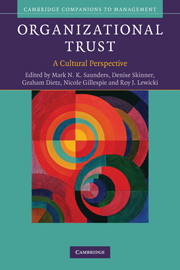Book contents
- Frontmatter
- Contents
- List of figures
- List of tables
- Note on editors
- Note on contributors
- Foreword
- Editors' acknowledgements
- Part I The conceptual challenge of researching trust across different ‘cultural spheres’
- Part II Trust across different ‘cultural spheres’: inter-organizational studies
- Part III Trust across different ‘cultural spheres’: intra-organizational studies
- Part IV Conclusions and ways forward
- Index
Foreword
Published online by Cambridge University Press: 05 June 2012
- Frontmatter
- Contents
- List of figures
- List of tables
- Note on editors
- Note on contributors
- Foreword
- Editors' acknowledgements
- Part I The conceptual challenge of researching trust across different ‘cultural spheres’
- Part II Trust across different ‘cultural spheres’: inter-organizational studies
- Part III Trust across different ‘cultural spheres’: intra-organizational studies
- Part IV Conclusions and ways forward
- Index
Summary
Trust is widely studied yet remains elusive. Everyone agrees that it is important, that social life could not exist without it, and that it is valuable, since the cost of building structures and controls that substitute for trust in and between organizations is enormous. More elusive still is how trust is established and sustained across cultures by those doing organizational work. Trust requires sending signals of trustworthiness, and differences in the meaning and interpretation of signals is the very essence of different cultures. As this volume's editors, Mark Saunders, Denise Skinner, Graham Dietz, Nicole Gillespie and Roy Lewicki note, people from different cultures often bring mutually alien values and beliefs, uninterpretable behaviours, and incompatible assumptions to their organizational work, all of which can undermine the trust necessary to successful interactions and fruitful collaboration. These scholars address such fundamental questions as how do people from different cultures understand and develop trust in one another? How do they go about building, maintaining and repairing trust in their own culture, and with those in other cultures? Which practices work best to build and sustain successful cross-cultural trust in particular settings? This book reports the current state of our knowledge about cross-cultural trust building, and helps to further our deeper understanding of cross-cultural trust building in and across organizations.
This book brings together leading-edge conceptual thinking and empirical research on the nature, meaning and development of trust across multiple cultural boundaries. It is genuinely international, pulling together the leading trust scholars from around the world.
- Type
- Chapter
- Information
- Organizational TrustA Cultural Perspective, pp. xix - xxPublisher: Cambridge University PressPrint publication year: 2010

